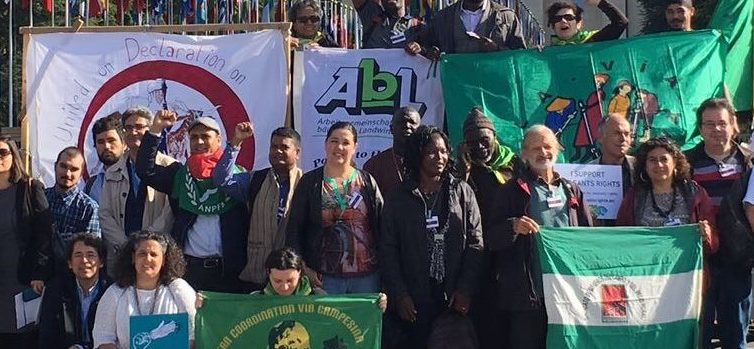
The fourth session of the Working Group on the Rights of Peasants and Other Persons Working in Rural Areas was held from 15 to 19 May 2017 at the Palais des Nations in Geneva. As in previous years, the CETIM was present accompanied by a major peasant delegation of La Vía Campesina (LVC) and other rural organizations (fishers, pastoralists, nomads, indigenous peoples, agricultural workers).
The CETIM has long been deeply involved in the struggle for recognition of the rights of peasants and other persons working in rural areas. Thus, along with FIAN International and La Vía Campesina it has long been supporting the historic project for a United Nations declaration on the subject; the objective being to develop new international legal norms to better protect these actors who are essential for an agriculture that is healthy and sustainable from a social, economic, cultural and environmental point of view.
The process for the adoption of this new legal instrument, begun in 2012 with the creation of the intergovernmental working group under the aegis of Bolivia, this year held its fourth session. The working group’s Chair-Rapporteur, the Ambassador of Bolivia, Nardi Suxo Iturre, presented the third version of the draft declaration, arrived at after numerous intense consultations (40 in all) in 2016-2017 with governmental delegations as much as with non-governmental (peasant and rural organizations in particular) and representing all the United Nations geographic regions. The demands and amendments proposed by LVC and its allies are to a large extent reflected satisfactorily in the new text. Most of the member states participating in the session expressed their satisfaction with the declaration’s revised draft.
The week of negotiations was marked by constructive discussions. Many countries, such as Switzerland, India and Russia, reiterated their support for the process while other did so simply by their presence.
The entirety of the African countries, represented by Tunisia (speaking in the name of the African Group), spoke in favor of the process and of the adoption of a declaration on the rights of peasants and other persons working in rural areas.
Venezuela (speaking for the non-aligned countries) gave its support to the declaration negotiating process.
The great majority of the Latin American also demonstrated their firm support of this historic process. El Salvador (representing the CELAC) emphasized the contribution to the health of the environment of peasants and traditional agriculture. On the other hand, certain Latin American countries such as Paraguay, Mexico and Guatemala expressed their reservations regarding certain articles.
Regarding the European Union, which participated actively in the discussions, it presented several amendments the majority of which consisted of deleting the term “right” in almost all the articles! This amounted to making voiding them of content and denaturing them, given that in the context of the Human Rights Council, the discussions focus exclusively on rights. It is regrettable that the European Union member states did not intervene constructively in the discussion whereas it is they who must assume their responsibilities both within the Human Rights Council and within the United Nations General Assembly and not the European Union as an institution, for the E.U. is not a member of either of these instances.
Regarding the United States, the only member state to formally oppose the process, they were noteworthy for their absence.
The peasant delegates and those of other rural organization, backed by the CETIM, intervened, with solid arguments to defend the draft declaration’s various articles as well as to present amendments. Thus, the delegates of La Vía Campesina and other partner rural organizations presented roughly a hundred oral statements to the working group plenary.
Outside the plenary, the CETIM co-organized two parallel conferences. The first, organized with LVC and FIAN International, “Collective Rights: Perspectives of Peasants and Other Persons Working in Rural Areas”, saw the participation of persons from various regions of the world. They shared their demands concerning the recognition and importance of collective rights in the context of the resistance of rural organizations to a predatory economic system destructive of collective and traditional practices. The second, organized with the International Federation of Rural Adult Catholic Movements (IFRACM), had as its title “The Declaration on the Rights of Peasants and Other Persons Working in Rural Areas: Right to Farm-Saved Seeds and Food Sovereignty”. The affirmation of these two rights is a means to implement the right to food in all rural areas, in the Global South as well as the Global North.
The third and last reading of the draft declaration was crowned with success. It was agreed that a fifth and last working group will be convened in 2018 in order to polish the text and to formally adopt it. Until then, the peasant and rural organizations (fishers, pastoralists, nomads, indigenous peoples, agricultural workers), with the support of other civil society organizations, must mobilize to broaden ever more the support for the declaration.